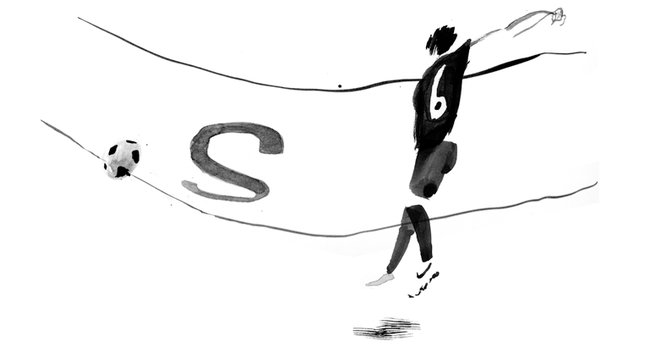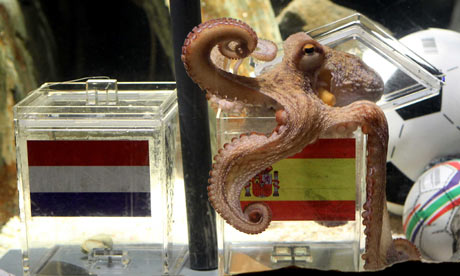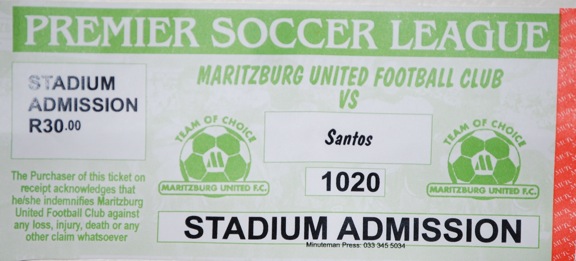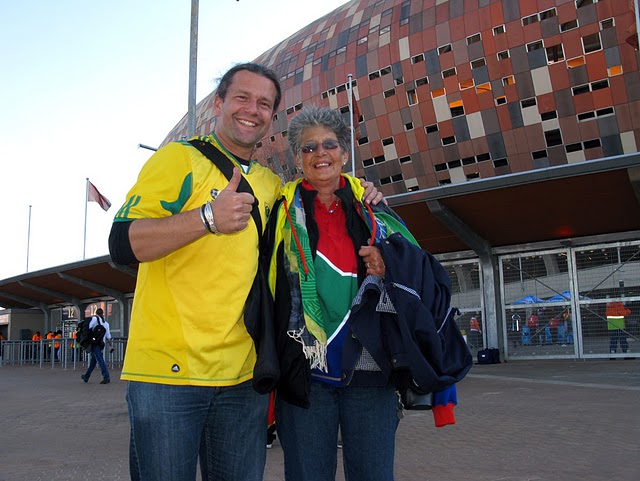Keme Nzerem of Channel 4 News in the UK returns to South Africa. It will be interesting to see how the various media address the legacy of Africa’s first World Cup in the weeks ahead.
Tag: 2010 World Cup

Happy New Year to all!
Back after a month-long break, we are pleased to report that our very own Sean Jacobs made it into the opinion pages of The New York Times yesterday (Sunday, 2 January 2011) as part of the ‘Around the World in 12 Months’ feature. (Some of you may recognize some of the ideas from Sean’s ‘Africa is a Country’ blog). My favorite part is his daughter’s memory of the 2010 World Cup. Click here to read Sean’s entry about the 2010 World Cup in South Africa.
RIP Paul The Octopus

Anti-vuvuzela campaigns in Europe, North America and now South Africa have attacked the most audible symbol of the 2010 World Cup. Yesterday more bad news: Paul The Octopus, the “tentacle tipster” that emerged as one of the tournament’s most popular characters, has died. Paul is dead! Like The Beatles, it was fun while it lasted . . .
Poor People’s World Cup
Day 4 of the Rhodes Politics Department’s Teach-In on the 2010 World Cup featured three speakers representing social movements critical of the global spectacle. In the video, Ashraf Cassiem of the Western Cape Anti-Eviction Campaign talks about an alternative tournament that took place alongside the FIFA gig: The Poor People’s World Cup. Check it out.
SA World Cup Legacy: Ticket price hike

The South African Football Association and the Premier Soccer League have announced a dramatic increase in ticket prices for 2010-11 PSL season. The official explanation given was a need to ensure the long-term sustainability of World Cup stadiums and provide funds for grassroots football.
‘It’s nice to say we filled Soccer City with 88,000 people, but how much do we charge them, R50? [Generally, it’s R20-25.] ‘What is the cost of hiring that stadium? Over R500,000,’ SAFA CEO Leslie Sedibe recently told a parliamentary committee.
PSL chairman Irvin Khoza said on Friday that high stadium costs and an agreement with the South African Players Union for a minimum wage and basic rights meant that, ‘We have no option but to increase our prices. It is always unfortunate when one has to make increases, but there is no way we can continue to charge R20 for 90 minutes any longer.’
Neither Sedibe nor Khoza commented on the inconvenient fact that only two of the ten expensive World Cup stadiums are scheduled to regularly host PSL matches. The exceptions are: Durban’s Moses Mabhida Stadium, AmaZulu’s home base, and Royal Bafokeng in Rustenburg, home of Platinum Stars. Perhaps a third one will follow if Ajax Cape Town end up using Cape Town Stadium. Cities without PSL teams like Polokwane, Port Elizabeth and Nelspruit are desperate to get rugby into their new stadiums to have a (distant) shot at making ends meet.
Meanwhile in Gauteng, Orlando Pirates, Kaizer Chiefs, Moroka Swallows, Mamelodi Sundowns and Supersport United announced their home grounds for 2010-11: Orlando Stadium, Rand Stadium, Dobsonville Stadium, HM Pitje Stadium, and Super Stadium respectively. These high-powered clubs, in other words, shunned the 2010 venues of Soccer City, Ellis Park, and Loftus Versfeld for smaller, cheaper grounds.
Local football bosses have also argued that ticket revenues would, of course, benefit grassroots football. ‘Prices will have to be revisited if we are serious about funding development because that’s where the money will come from,’ said Sedibe. SAFA’s pitiful record in every aspect of local football development — infrastructure, youth programs, coaching, administration — means only the most delusional fans believe that additional ticket revenues will suddenly make SAFA ‘serious’ about improving the grassroots game.
With R40 billion in public funds spent on World Cup stadiums and other 2010 construction projects, it is no wonder that fans are angry about the ticket increases. R40 is a substantial amount of money for a typical local supporter who earns about R1500 a month; and he or she is among the fortunate ones who have a job since the unemployment rate in South Africa is 25 percent (the unofficial rate is 40 percent). As the seventh richest league in the world, shouldn’t the PSL, rather than blue-collar fans, help offset some of the costs? Imagine, a wealthy private company not dumping all of its costs on the backs of ordinary people!
The ticket saga highlights a crucial legacy of the World Cup: South Africa’s deeper incorporation into the media-driven global football business. The powerbrokers in domestic football appear less interested in expanding the fan base than in creating more profitable audiences. These are made up of middle-class folks willing and able to pay for pricier tickets, merchandise, satellite TV packages, broadband internet and the other luxuries of contemporary fandom.
In light of these changes, what can be done? Well, one good place to start is to fight to ensure equitable access to the professional game at stadiums and on television. Fans should be able to pay fair and reasonable ticket prices, especially when stadiums are built with public funds. In addition, pressure must be put on broadcasters, football bodies, and regulatory authorities to show as many local and international matches as possible on free-to-air TV. It is the People’s Game after all.
Phillip is Here!
The Footsak exhibit at the Museum of Contemporary Art in Durban inspired me to make this 5-minute film about art + football. I shot it with a FlipVideo camera at the museum, World Cup matches, a tennis court in Joburg, a sports ground at UKZN Pietermaritzburg, and our veranda. Take a look.

Chris Bolsmann (Sociology, Aston University) is the special guest in our latest episode of the Africa Past and Present podcast reflecting on the 2010 World Cup. Topics covered include experiences at stadiums and fan parks in South Africa; FIFA‘s Disney-fied World Cup; Pan-Africanism and the performance of African teams; and the political and economic impact of the tournament.
Click here to listen to the podcast. (mp3)